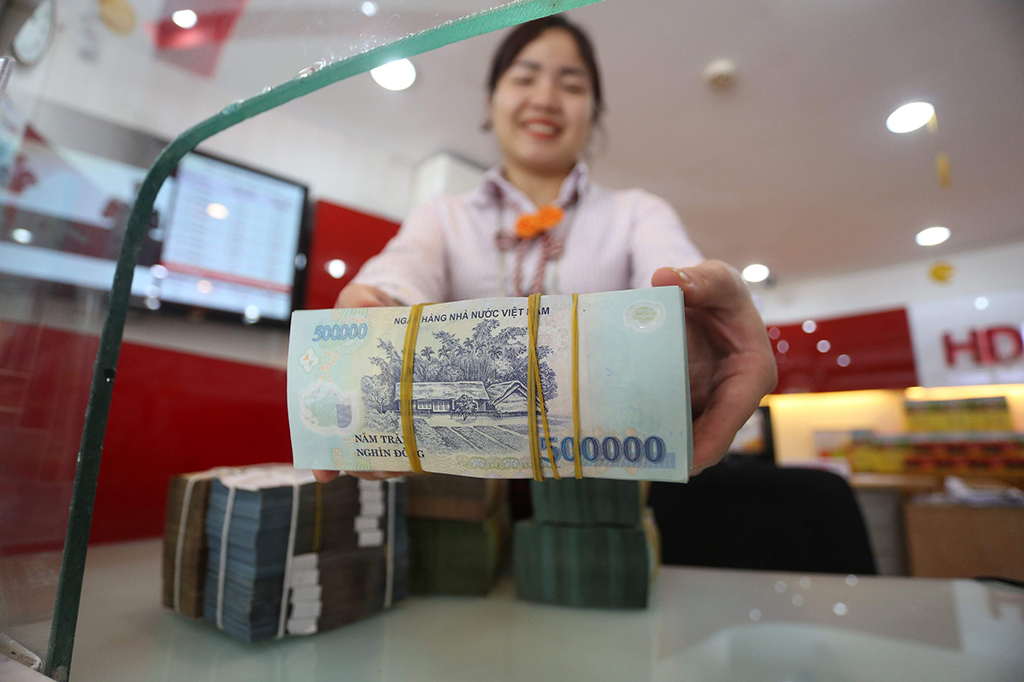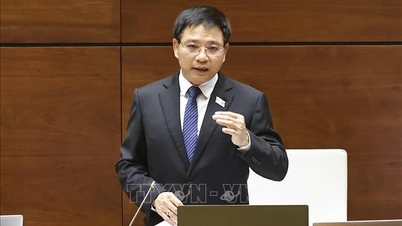Interest rates on both existing and new loans have decreased simultaneously.
Mr. Tran Thanh Phong, Director of Thien But Food Company, said that the current business situation is more favorable than in previous months due to increased food demand. Therefore, the company recently renewed a 3-month loan agreement with an interest rate of 6-6.5% per year, depending on the bank.

Lending interest rates have decreased.
Mr. Tran Thanh Phong commented that banks offer low-interest loans, even in a context of difficult credit conditions, but the approval process is also very thorough. Loan applications from customers with overdue debts are more difficult to process. This also applies similarly to individual customers.
Mr. PH said that he recently sold a plot of land for about 3.5 billion VND. The buyer had 35% of the capital, and the rest was borrowed from the bank. The customer mortgaged the purchased land itself. At that time, the bank appraised the land at about 3 billion VND, lending 70% of the appraised value at a fixed interest rate of 8% per year for the first two years. After that period, the interest rate would be equal to the base interest rate plus a margin of 2%. "The biggest challenge for borrowers right now is proving their income in the context of reduced salaries and difficult business conditions," Mr. PH said.
Ms. Nguyen Thuy (residing in Tan Binh District, Ho Chi Minh City), who has a 2 billion VND debt at Vietcombank , had her loan interest rate reduced by the bank from 11%/year to 9%/year for six months more than a month ago. This reduction saves Ms. Thuy approximately 3 million VND in interest payments each month. However, for new loans, Vietcombank is applying a fixed interest rate of 7%/year for an extended period.
"If the old loan interest rate could be reduced to 7% per year like the new one, I would save more than 3.3 million VND in interest payments each month. But since the adjustment period hasn't expired yet, I have no choice but to transfer this debt to another bank," Ms. Thuy said, adding that she has consulted several banks currently applying new loan interest rates at 6.5-7% per year. However, the current problem is that Ms. Thuy's company recently reduced salaries by about 30%, so proving her income to repay the debt is no longer easy, and she is still calculating her options.
Similarly, Ms. Thanh Ngoc (residing in Thu Duc City, Ho Chi Minh City) borrowed 1 billion VND from Vietcombank in July 2023 for a 5-year term, with a fixed interest rate of 9.5% per year for the first two years, after which the interest rate would be variable. A month ago, Ms. Ngoc contacted a bank employee for assistance in reducing the interest rate, but was told that deposit interest rates were high at the time of borrowing, so a reduction was not possible. However, after researching that some banks allow loan transfers between banks, Ms. Ngoc proactively contacted the loan officer again requesting a reduction. The bank then agreed to reduce the interest rate to 7.5% per year. "Previously, I paid over 7.9 million VND in interest each month, but now it's reduced to nearly 2 million VND, which is a relief," Ms. Ngoc said.
It's safe to say that banks have never before been competing to lower lending interest rates as they are now. Large banks like Agribank , Vietcombank, VietinBank, and BIDV are applying interest rates for home loans in the first year ranging from 6.5% to 8.5% per year. BIDV applies interest rates from 6.5% per year, Vietcombank from 6.7% per year, Agribank from 7% per year, and VietinBank from 6.4% per year.
For private joint-stock banks, the race to lower lending rates is even more intense. After announcing lending rates of 5.5%/year for the first 3 months and a fixed 7.5%/year for the first 6 months, just two weeks later BVBank adjusted its rates down by 0.5-1%/year, to 5%/year and 6.5%/year. VPBank offers loans at 5.9%/year with a 25-year term.ACB applies home loan interest rates of around 7-8%/year or a fixed 9%/year for the first 2 years…
Foreign banks are also participating in reducing lending interest rates. For example, Shinhan Bank applies a preferential interest rate of 6.6%/year fixed for the first 6 months, with a maximum loan-to-value ratio of 70% for a 30-year loan term; while the fixed interest rate for 1 year is 6.8%/year, for 2 years is 7.4%/year, and for 3 years is 8%/year. UOB is currently offering home loans at an interest rate of 6%/year…
Even with low prices, the business is still struggling.
Compared to a year ago, the lending market is completely reversed, with banks continuously lowering lending rates and actively seeking customers to disburse loans. Preferential or even old lending rates have now been halved. However, in the first two weeks of 2024, some banks reported that credit growth remained unfavorable compared to previous months. Lending remains quite slow due to the general impact from the end of 2023 that continues to this day.
Furthermore, January is a low-demand month for lending. Businesses and individuals who borrowed to produce goods for the Lunar New Year usually did so in previous months, so they tend to borrow less during this month and focus primarily on repaying debts. This is also a common mindset among East Asians, who are concerned with repaying debts before the Lunar New Year. Moreover, customers are also wary of risks at this time, as purchasing power in the market has not yet increased significantly. All these factors combined have resulted in credit growth in the early days of the year not meeting expectations.
"The race to lower lending interest rates is accelerating in order to attract more customers. However, at this time, good customers are hard to find, so banks are looking for customers from other banks. Banks that keep lending interest rates high will lose good customers, so they have to lower rates for both existing and new customers. The competition for loans has never been as fierce as it is now," admitted the director of the individual customer division of a joint-stock bank.
According to this expert's analysis, some banks have been offering 0% interest rates for the first few months of a loan to attract customers. Some even pay commissions to those who successfully refer customers, ranging from 5-10 million VND per loan to 0.5-1.5% of the loan value. A 0% interest rate means banks incur losses in the initial months. Although two-thirds of banks have reduced savings interest rates to low levels, interest rates for deposits under six months are commonly 2-3% per year, over six months 4-5% per year, and some banks offer 5-6% per year for deposits over 12 months. To compete in lending, banks add a margin of approximately 2-4% per year (instead of 4-5% as before) to achieve short-term lending rates of 6% per year and medium- to long-term rates of 8-9% per year. This is only the break-even point because banks have to set aside provisions for risk, deposit insurance, operating costs, etc.
Expert Nguyen Tri Hieu believes that with a 0% lending interest rate, banks will certainly incur losses in the first few months. To compensate for these losses, banks will increase lending interest rates after a period of "preferential" rates, which could be the average deposit interest rate of several banks plus a margin of up to 5%, or compensate for losses through other service fees.
"Preferential loan interest rates only apply for the initial period of 1 or 3 months, so customers need to be aware of the regulations regarding interest rates after the preferential period ends. There's no such thing as a free lunch. Therefore, borrowers need to carefully review the regulations on how interest is calculated after the preferential period," Mr. Hieu advised, predicting that lending interest rates will continue to decrease in the first quarter as banks face a surplus of capital, mobilizing funds but unable to lend them out. However, from mid-2024 onwards, deposit and lending interest rates may increase as the economy's capital needs grow.
Several securities companies have forecast that lending interest rates in 2024 may decrease further by 0.75 - 1.5% per year. Specifically, KB Securities Vietnam (KBSV) forecasts that the average lending interest rate will have room to decrease by another 0.75 - 1%. VCBS Securities Company forecasts that the overall lending interest rate level may decrease by approximately 1 - 1.5 percentage points in 2024.
Source link









































































































Comment (0)